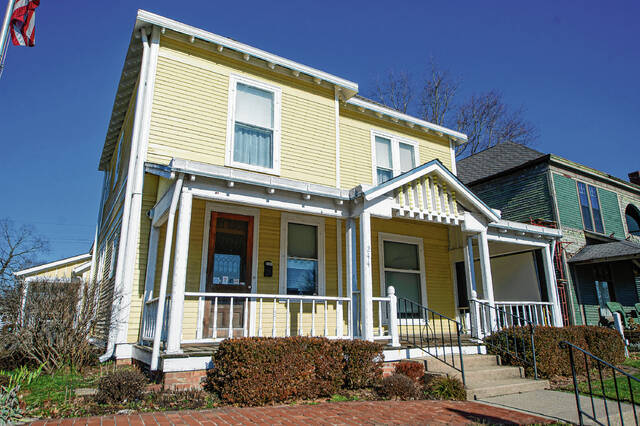
The city, which owns the Riley Boyhood Museum and the Hoosier Poet’s childhood home next door, has notified the Riley Old Home Society that it is terminating the nonprofit’s dollar-a-year lease of space in the museum. (Tom Russo | Daily Reporter)
GREENFIELD – In a dispute between the city government and one of the community’s oldest nonprofits, the Riley Old Home Society is not ready to back down.
In a statement to address charges it is not properly managing a trove of thousands of historical items relating to James Whitcomb Riley, the organization made clear this week it will continue claiming the exclusive right to make decisions about the collection of artifacts stored at the James Whitcomb Riley Boyhood Home and Museum.
In a statement, the Old Home Society said it is “clearly the owner” of the artifact collection.
“The fact that the ROHS has been the responsible party for acquiring artifacts for the Riley collection is well documented in public documents, newspaper articles and city documents. It has also been witnessed by hundreds of people – including city officials, city employees, volunteers and donors,” the statement said.
Meanwhile, the city is maintaining that the Old Home Society must do more to legally establish its ownership of the artifacts. The collection currently resides on the second floor of the museum on West Main Street, where it’s kept behind a door padlocked by the Old Home Society. But because the city owns the building, society volunteers can only enter with 24 hours’ notice, and bags are searched when they leave to ensure items are not removed.
Communications between the two entities have broken down over access to the artifact collection. The city says it hasn’t been provided with enough knowledge about the contents, and the Riley Home coordinator, Stacey Poe, hasn’t have enough access to make decisions about programming at the museum.
On Jan. 5, the city served the Old Home Society with notice that it was terminating the organization’s lease for the second floor of the Riley Museum, which it had been renting for $1 per year.
City attorney Gregg Morelock said at the time that the Old Home Society didn’t have adequate documentation of the collection’s ownership and wouldn’t be allowed to remove artifacts unless it could show it owned them.
Since the inception of the Old Home Society, an agreement between it and the city has stated that the society owns the artifact collection, while the city owns the building where it is stored.
The Old Home Society’s statement said the actions of the city in the past show that they always regarded the society as the owner of the collection.
“The city has never enjoined any sort of legal efforts to create contracts for donations, loans, accessioning or deaccessioning,” the statement said, referring to the process by which items are acquired and cataloged. “The city has not purchased any software for collections management or the equipment to process it. The city has not had objects conserved in order to repair damage.”
Ownership of museum artifacts is typically governed by a unique set of museum property laws. When donors give items to a museum, they typically fill out a gift agreement form relinquishing their ownership rights. However, many of the items in the Riley collection were donated before that law existed, and less formally.
Because of that, the Old Home Society said in its statement, the organization followed the procedure state law outlines for establishing ownership of items donated without a gift agreement. That included placing an advertisement in the Daily Reporter asking, as a formality, about the ownership of certain items.
The Old Home Society said that although the city responded to the ad asserting an ownership claim on the items, it didn’t have grounds to do so because it didn’t donate them.
Morelock said many of the items in the Riley collection can’t be shown to belong to the Old Home Society. He said many of them were simply dropped off at the museum, often by people who didn’t understand that the museum and the society that controlled the collection were legally distinct entities.
“This is a legal question, and you can’t just assume things,” he said.
Morelock said the city has only ever asked for full documentation of what was in the Riley collection and the ability to access it for use in museum programming.
The statement said the Old Home Society has made substantial efforts in recent years to care for the Riley collection in accordance with professional museum standards, noting that three of its members have experience working in museums.
“We hope that the city will come to their senses and recognize the value that ROHS provides in free labor for something the city has repeatedly said they cannot afford to provide,” the statement said. “This has been a great savings for taxpayers. We should also be encouraged that the Riley Home is becoming a respected facility within the museum community through the efforts of ROHS. Let’s move forward in forging a great facility that not only preserves our past, but is also a dynamic location for learning, and entertainment.”
